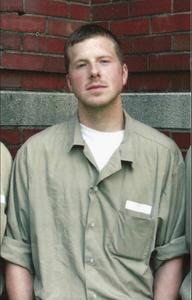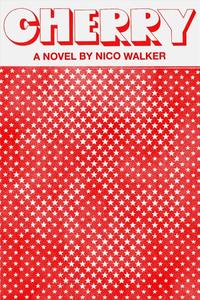 Nico Walker is a former U.S. Army medic and Iraq War combat veteran. He's currently incarcerated in a minimum security federal prison, serving an 11-year sentence for multiple bank robberies. His debut novel, Cherry (Knopf, $26.95), is reviewed below.
Nico Walker is a former U.S. Army medic and Iraq War combat veteran. He's currently incarcerated in a minimum security federal prison, serving an 11-year sentence for multiple bank robberies. His debut novel, Cherry (Knopf, $26.95), is reviewed below.How does it feel to have this story, with all its pain and difficulty, out in the world?
I'm not in the world these days, so it doesn't feel like it has much to do with me. It isn't that I don't care what people think about the book; I put a lot into making it, and I'd rather find out that readers thought it was worth the trouble than find out that it wasn't well-received. But at the same time, the truth is I can't even remember what it's like to not be in jail, and the wider world is just an abstract concept in my head, so I don't feel vulnerable, and I don't feel like there's any danger in writing the way I do.
When I was working on Cherry, there came a point where I had to accept that the book would be what it would be, and there were no other considerations to be made as far that went. Maybe it was easy for me because it wasn't like I had any sort of reputation at stake. The only thing I cared about was writing a book that would stand up and being true to that. Once you're in it, there's no going back, so you have to follow it to the end.
It's a daunting project to tackle the writing of a novel, especially one this intensely personal, as your first published work. What prepared you to write Cherry?
I read a lot for the first years I was locked up. There wasn't much else to do. I remember I was in the hole once for a few days, and I was lucky because I had a copy of Dostoyevsky's The Idiot in the cell with me. I read it three times. But I was already in the habit of rereading books by then. When I was in pre-sentence custody, there weren't tons of good books around. So if you got a good one, you held on to it and read it a few times. I think this habit helped me later on, when I was working on Cherry. You reread books and start to get an understanding of how they're made. The technique. You pay attention to what's going on with the tense, the transitions, etc., in a way that you maybe didn't in your first pass. I'm not especially widely read, but I've reread more than people generally do.
The drug addiction and intense PTSD you suffered after you returned from Iraq is a big part of your personal story and of your novel's protagonist's. Have you realized any therapeutic benefit from writing this novel?
I don't know. It took so long writing it, four years, that I can't tell if it was writing a novel or just time passing that has made the war experience seem far off, like it happened to someone else. It's in the past. I've learned what I learned from it, and now I'm here.
 What do you hope readers will take away from such a frank account of what it's like to serve in combat in a place like Iraq?
What do you hope readers will take away from such a frank account of what it's like to serve in combat in a place like Iraq?I didn't want to romanticize this sort of thing. I just wanted to give an honest account of it, based on what I know. I definitely wasn't going to lie about what it's like to make it more interesting for people who go in for hero books. I wasn't a hero. I was about as average as it gets. I was in an average unit, and I didn't do anything worth mentioning. Still it was rough sometimes. And I wanted the reader close enough to get an idea of what that's about.
Do you have any writing role models and, if so, who are they and why?
Henry Miller comes to mind. Maybe this isn't the best year to go around telling people you like Henry Miller, but I respect what he did because he gave you what he believed was the truth regardless of whether he thought you'd hate him for it. I think he'd have been alright with getting shot over a book.
Also, I'm thinking of Thomas McGuane. I've got a lot of respect for his style. I studied him a lot when I was working on Cherry. He reminds me of the Russians, how comedy and tragedy is all the same. His writing is elegant as fuck and his timing is perfect. And he writes with conviction, but he doesn't make a big deal out of it. He's not begging for attention. He's cool about it.
Given your current circumstances, you won't be able to promote this book in any conventional way. If you were able to go on a book tour, what are some important things you would like readers to know?
I'd like them to know that I'm grateful to them for reading the book.
Do you have any current writing projects?
I'm always working on something nowadays. I've got some short stories I've been writing. And then I've got some stuff that I'm working on that'll be a novel one day, if I live long enough. --Harvey Freedenberg, freelance reviewer

